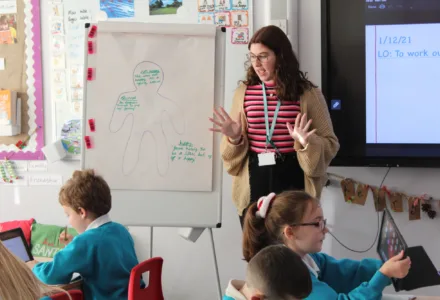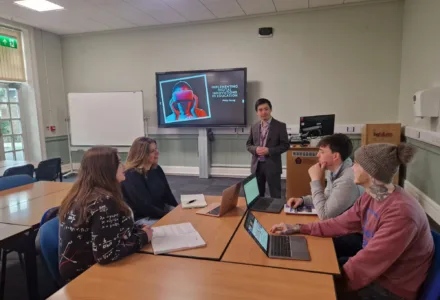Why study this course
Allows you to continue working or volunteering while pursuing your degree, providing you with valuable practical experience alongside your academic studies
The National Student Survey in 2022 revealed an impressive satisfaction rate of 96.85% among students in professional studies programs, highlighting quality and effectiveness
Opportunity to study with the support of a research-active team, ensuring you receive the latest insights and developments in the field of child education
Free pre-teaching course and guaranteed interview for a PGCE (Postgraduate Certificate in Education). This unique opportunity opens doors for students aspiring to become teachers, providing additional support for career goals
Course summary
Are you ready to take the next step in your educational journey? The BA (Hons) Education in Practice programme is the perfect opportunity for individuals who have already completed BGU's Foundation Degree Education in Practice, as well as those with similar qualifications from BGU and other institutions. This programme allows you to work or volunteer for a minimum of two days per week in an education setting while working towards a Bachelor's Degree.
Key facts
|
Award |
BA (Hons) |
|---|---|
|
UCAS code |
X302 |
|
Duration |
1 year |
|
Mode of study |
Full-time |
|
Start date |
September 2025 |
|
Award |
Bishop Grosseteste University |
|
Institution code |
B38 |
Apply for this course
When you're ready to apply, the route you take will depend on your personal circumstances and preferred method of study. Click the relevant button below to start your application journey.
About this course
Our work-based degree programme offers a unique blend of practice-based learning and weekly campus-based teaching sessions. Over the course of one year, you will integrate your previous study and experience in an education context, deepening your understanding of current issues, education practices, and practitioner research. Whether you come from a background in primary, secondary education, or the lifelong learning sector, this programme emphasises the importance of formal education.
We understand the importance of maintaining your current employment or volunteer commitments. That's why our programme is designed with your schedule in mind. You'll attend classes one day per week on campus, starting from 1 pm, allowing you to continue working and earning while pursuing your degree.
This course offers you the chance to critically evaluate your practice by closely examining the systems, procedures, and changes within your field of work and study. The modules will foster your professional development as a reflective practitioner, covering topics like leading people and teams, addressing contemporary issues, and adopting critical approaches to pedagogy. Additionally, you will undertake an independent research study, further enhancing your skills and knowledge in the education sector.
The BA (Hons) Education in Practice is designed for applicants employed as Teaching Assistants or in other support roles within schools or colleges. You often work alongside qualified teachers, providing invaluable support for children, young people, or adults, including those with additional needs. We also encourage collaboration with students from related degree courses, offering diverse perspectives from various educational contexts, such as early childhood and youth services. This collaboration enriches your understanding of the broader education landscape in which you work.
What you will study
Students on this course currently study some or all of the following modules:
This module introduces you to the planning and design of an independent study and serves as a prerequisite for the Level 6 final independent study module. It introduces you to, and guides you through planning a research question, deciding on an appropriate research method and sample group that will allow you to complete the small-scale research project in Independent Study Part 2 module. In addition, you will create a research proposal by and engage in theoretical and practical principles, as well as learning to recognise your own limitations. The module is based on ethical concepts and policies, and you will study ethical complexity in connection to your chosen research subject and show this by participating in the ethical approval process.
This module will develop your capacity for critical thinking and analysis and encourage you to form and articulate an argument which is robustly supported by relevant sources. The module will enable you to study a pertinent, critical issue within your sector. Taught content will offer examples of current, and potential future issues in the field of early childhood, childhood and youth and education. By exploring a range of issues, the teaching and learning strategy undertakes to present a model of how to select and investigate a critical issue and craft an argument that draws upon (for example) practice-based evidence, national/local statistics, published research and established theory. You will investigate the political, social and/or economic drivers behind your chosen issue and consider the implications for professional practice. These may include, for example, the contribution of multi-agency colleagues, international perspectives and the barriers and affordances of the issue within your own work setting and professional practice.
The module adopts a work-based and problem-solving pedagogy where learning is grounded in the external context of your professional practice. Assessments require application of what is being learnt to your practice context, enabling you to solve real issues from your organisations and reflect on your own work-based experience. The module provides the opportunity to focus in some depth on aspects of professional practice including leadership and management. The module content will involve the study of key aspects of professionalism such as reflective, critical and ethical practice where you will explore relevant theoretical perspectives. Legal frameworks and national standards will be examined in relation to personal competencies and leading practice within settings. Leadership and management theory will be critically evaluated. Interagency and collaborative working will be critically explored and issues of facilitating dynamic change within the sector in response to global and cultural influences will be addressed.
This module underpins your professional development as critical, reflective practitioners in learning, teaching and assessment, according to your own professional contexts. It encourages critical engagement with curricula and practical application of pedagogical theory. This module is structured around a work-based project that develops your ability to plan and evaluate creative, structured learning opportunities.
The Independent Study builds on earlier inquiry-based studies and acts as a culmination of studies. This module provides an opportunity for you to carry out a small-scale research project related to your work supporting children, young people and/or families demonstrating the ability to manage your own learning, and to make use of scholarly reviews and primary sources. The subject is founded on ethical concepts and principles, and you will investigate ethical complexity in relation to your research topic of choice. This module requires you to draw on and apply the broad knowledge-base and research skills that have been developed across your undergraduate studies in a fully developed individual, inquiry-based study. You will review research design, methods, and data collection and analysis tools and software appropriate to practitioner research. Ethical issues will be addressed, including the key principles of informed consent, anonymity and confidentiality. There will be an emphasis on enabling you to demonstrate the limitations and uncertainty of knowledge and the influence of perspective and theoretical approaches on findings and conclusions. The importance of writing with a high degree of accuracy and fluency for an academic audience will be reinforced and made a clear expectation.
Entry requirements
- Applicants will typically have 240 HE credits from a Foundation degree or a HE Diploma in a relevant field of study.
- Applicants are expected have a current (or prospective) voluntary or paid employment in a relevant setting for a minimum of 360 hours per academic year equating to 12 hours per week of study.
- Typically, applicants are expected to have three years of experience in a voluntary or paid role working with children.
- Students must complete and submit a workplace agreement that sets out the tripartite partnership between the student, the setting and the BGU and clearly identifies the student holds a current DBS as a condition of enrolment.
- Applicants with alternative qualifications can contact our Admissions team for advice as BGU is committed to widening access and participation and adheres to a strict policy of non-discrimination.
Further information
In accordance with University conditions, students are entitled to apply for Recognition of Prior Learning, RP(C)L, based on relevant credit at another HE institution or credit Awarded for Experiential Learning, (RP(E)L). If you’ve recently completed or studied a particular module as part of a previous qualification, this may mean that you’re not required to undertake a particular module of your BGU course. However, this must be agreed in writing and you must apply for this.
How you will be taught
This course allows you to study and continue to work. It is a flexible qualification covering the issues in Foundation, Primary, Secondary and the Lifelong Learning sector with the emphasis on formal education. Students undertaking the course remain in employment, or as volunteers, over the academic year in the same manner as the Foundation Degree.
The Top Up Degree offers opportunities to critically evaluate practice through a detailed analysis of the systems, procedures and changes that contribute to your field of study. This course will promote your professional formation as a reflective practitioner and modules will cover topics such as leading people and teams, promoting quality, new models of practice and contemporary issues such as current political and social trends.
In addition, the undertaking of an independent research study will support your continuing development as a leading practitioner.

Academic staff
Assessment
A variety of assessment methods are used including presentations, discussions, debates, poster presentations, essays, portfolios of work, case studies and reflections. All assessments allow you to reflect on your practice and theory as you evidence your learning, building on your personal strengths to develop clear communication skills to share your knowledge and understanding.
Careers & Further study
Graduate opportunities have enabled our students to attain managerial positions within their sector, to lead practice with their setting. Many go on to further study to become teachers through our PGCE routes, or gain a professional status. Others take on professional roles in areas such as special educational needs, mentoring, subject support, school, family and welfare liaison roles in the wider educational community and with local authorities working with the full range of age groups and sectors.
The completion of the BA (Hons) Education in Practice degree can lead to teacher training, advanced support roles and team leadership in education settings, or further study at Master's Degree level.
What Our Students Say
Discover what life is like at Bishop Grosseteste University from our students.
Ethical considerations of doctoral methodologies Podcast
Dr Nyree Nicholson is a Programme Leader on our work-based Foundation Degree programmes. The title of her doctoral research was “Supporting children with identified speech, language and communication needs at two-years-old: voices of early years practitioners”. Nyree utilised a narrative hermeneutic methodology with conversational interviews to explore the lived experiences of fifteen early years practitioners.
Samantha Hoyes is a senior lecturer in Early Childhood Studies and is currently part way through her PhD. Her focus is on working motherhood in the 21st Century and how working mothers make sense of their identities. Applying a post-structuralist feminist approach, Sam has utilised photo elicitation interviews to explore working mothers lived experiences. Sam's sample will consist of 10-15 working mothers living in Lincolnshire with a child/ children aged 0-5 years at the time of data collection. She is currently around halfway through her initial data collection.
In this podcast, Nyree and Sam discuss the methodological approaches taken in the research process and share the ethical considerations they encountered throughout the research process.
For any more question or queries please contact Samantha.hoyes@bishopg.ac.uk and nyree-anne.nicholson@bishopg.ac.uk













































